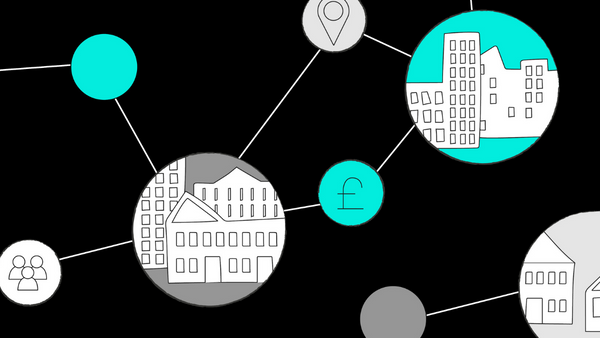Can a universal basic income improve the health and wellbeing of everyone? RSA’s Head of Research Hannah Webster, former Senior Participation Researcher Riley Thorold and former Researcher James Morrison elaborate on the findings of our new UBI report.
A Universal Basic Income (UBI) consists of cash payments, made periodically, to an individual, universal and unconditional basis. At the RSA – in a partnership led by Matthew Johnson at Northumbria University – we’ve been exploring the role a UBI might play in improving health and wellbeing outcomes. Today we’re celebrating the launch of that research; Challenging the mental health crisis: How Universal Basic Income can address youth anxiety and depression.

Challenging the mental health crisis
How Universal Basic Income can address youth anxiety and depression.
The Covid-19 pandemic widened inequality and deepened poverty in the UK while helping to normalise unconditional government payments via the ‘furlough’ scheme. This set conditions for a renewed interest in UBI, both within political parties and among wider society.
Politicians from several political parties, including the Liberal Democrats and many others from across the political spectrum, have since announced their support for a UBI and four local authorities in Scotland have researched the feasibility of piloting a UBI. Earlier this year, the Welsh Government launched one of the most generous basic income schemes trialled anywhere in the world. The results of these pilots and studies will help shape the UK debate on unconditional regular payments in the future.
Most of the existing research on UBI has assessed its role in reducing poverty, destitution, inequality and insecurity and there is now a substantial body of research to corroborate these arguments. For example, RSA modelling in Scotland suggests that certain UBI models would eradicate destitution altogether, and there is a longstanding body of work pointing to UBI’s role in promoting equality.
Separately, a well-established body of research has demonstrated the links between inequality, poverty and poor mental health outcomes. Wealth is now widely considered to be the most important social determinant of health.
UBI and mental health outcomes: uncovering the overlooked
Fewer studies, however, have attempted to join the dots between these fields of research to demonstrate a relationship between UBI and mental health outcomes, and fewer still have sought to discuss with the public what the details and benefits of a UBI might look like.
Although there has been theoretical work since at least the 1960s hypothesising the positive psychological impacts of a guaranteed income, and while there has been scattered, contemporary research backing up these arguments health has commonly been treated as at best a secondary outcome of UBI.
This has begun to change, with various research papers exploring the health impacts of UBI (see for instance Painter 2016, Ruckert et al 2018 and Johnson et al 2021), however, mental health is generally not the primary focus of these studies (some notable exceptions are Wilson and McDaid 2021 and Psychologists for Change 2017).
This means that, while claims that UBI could address mental health challenges are fairly common, there is less understanding of exactly how this might happen in practice. These questions can only be comprehensively and conclusively answered as part of a UBI trial explicitly designed to measure mental health outcomes (rather than this data being a by-product of wider research) – and we recommend that such a trial takes place. However, in the absence of this, our research seeks to shed light on these questions by exploring whether and how young people believe a UBI would impact their own, and other people’s, mental health.
A case for a future UBI mental health trial
We hope this qualitative research can provide a strong rationale for a future UBI trial monitoring young people’s mental health outcomes. It might also determine how this trial could be designed based on the experiences and preferences of young people. For example, how young people would receive this money, how much they might receive and how the payment would interact with existing benefits.
Our research has three key findings:
- The current system is failing young people: the young people we spoke to generally do not consider the current system to be fair or to be working for them personally, and most believe this is having a detrimental impact on their mental health.
- UBI is popular among young people and can benefit their mental health: most participants explicitly stated that a UBI would have some positive impacts on their mental health and all participants registered their support for some form of UBI payment.
- There are several non-financial benefits of UBI that can support young people’s mental health: reasons provided for the mental health benefits of UBI extended to non-economic determinants such as a reduction in social stigma, more personal independence, enhanced relationships and an improved ability to plan for the future.
Within the report, partners from Landman Economics bring an analysis of a UBI to these qualitative findings, with evidence showing that a UBI designed to meet minimum income standards would avoid or delay over 500,000 cases of anxiety and depression amongst young people in a 10-year period. Even stripped-back UBI payments from £145 per week for an adult would eradicate poverty and bring about tens of thousands of avoided and delayed cases of anxiety and depression.
These findings are a huge intervention in our understanding of the potential of a universal basic income and we hope our imagining of our social security more widely.
Read our Challenging the mental health crisis report to better understand how a universal basic income can benefit young people's mental health and wellbeing. A video of our launch event on Friday 21 October 2022 will also soon be available to watch.

Exploring the wellbeing impacts of UBI
The event marks the launch of a new RSA report exploring the health and wellbeing impacts of a universal basic income.
Related articles
-
Poor country, rich minority: why young people need a basic income
Blog
Matthew Johnson Elliott Johnson
A universal basic income can alleviate anxiety and depression in young people. Elliott and Matthew Johnson of Northumbria University explore the benefits this kind of economic security can deliver.
-
Young people's take on their economic security
Blog
Toby Murray Hannah Webster
The RSA’s research into young people’s economic security has found that 47% are financially precarious. Whilst this figure is stark, the ‘Age of Insecurity’ report shows the reality for young people is even starker.
-
Age of insecurity
Report
Toby Murray Hannah Webster
47 percent of young people are financially precarious, with certain groups facing even greater levels. This research investigates the stories behind these numbers.





